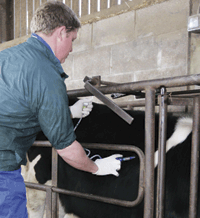Bluetongue risk remains, says BVA president

Little did I think when I qualified as a vet 30 years ago the sight of midges flying near our pond in late February would turn my thoughts to work rather than appreciating the sight of spring, writes Nicky Paull, president of the British Vet Association.
The cold winter this year does not mean we are off the hook as regards circulating bluetongue virus. The risk of midge-borne infections blowing in from the continent, as they did in 2007, are as high as ever. Added to that, there are still some farmers risking importing cattle from areas of Europe where bluetongue virus is circulating.
Sadly these imports are legal but, despite the desire for financial gain or a different line of genetics, I still cannot understand someone wanting to take the risk. Not only are they putting their own farm at risk, but are risking spread of infection to other farms. Bluetongue virus can spread as quickly as 5-10km a day once in the midge population.
Without continued protection by vaccination my concern is the financial disaster seen in the Netherlands in 2007 and then in France in 2008 will become England and Wales in 2009. With Scotland making vaccine compulsory at least we can see confirmed protection in one part of the UK. In England and Wales the choice is with the farmer but surely, not to vaccinate is like not insuring your house against fire. Can anyone afford to risk their stock in such a way?
Fertility concerns
It seems there are still concerns about fertility issues post vaccinating with rumours about abortions continuing to circulate. As use of the vaccine across the UK is now widespread, the adverse effects are just not being seen.
The risks of not vaccinating far outweigh any other concerns so, stealing the words from the JAB campaign, don’t hesitate vaccinate.
For the farmers who did vaccinate last year, cattle will only need a single shot. Vaccinating now will give protection before turnout and avoids the hassle of gathering animals back from grass.
Vaccination
Any bought in cattle of unknown vaccine status or youngstock who missed out on protection last year will need two injections three weeks apart. Vaccinating now will also make sure there is enough vaccine available. My concern is if everyone waits until there is a hint of the disease, a mad rush for vaccine could see insufficient stocks available.
I cannot see many practices keen to have large vaccines stocks after the financial disaster for several practices, where out of date vaccines had to be thrown away after clients decided they did not want the order.
Lastly I am aware as concerns turn towards BTV strain 1 as a risk from France, rumours of an all in one vaccine covering strains 8 and 1 are delaying decisions to boost with BTV8 vaccine alone. We do not yet have a vaccine against BTV1 licensed for use in the UK, although the licensing process is gearing up for one. But when it does come it will be a single strain vaccine, so waiting in the hope that a dual strain vaccine is around the corner will leave you susceptible this summer to infection.
